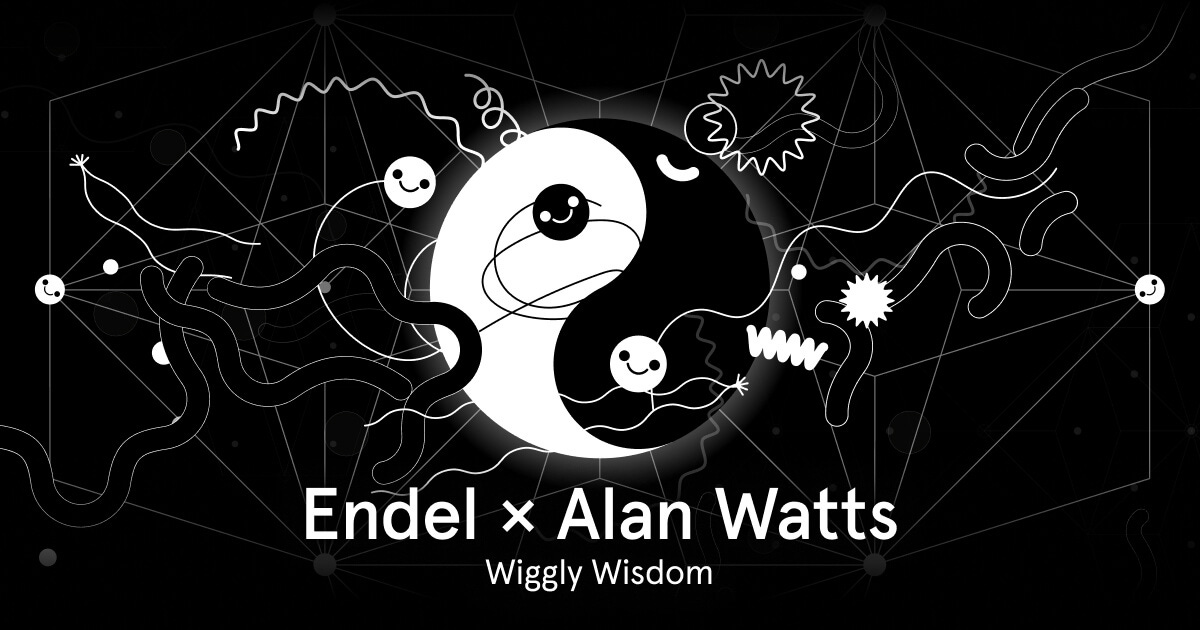idle gaze 042: a wiggly world wants wiggly wisdom.
What Alan Watt's enduring cultural cachet says about today's chaotic and complex reality.
In 2017, an advert for the Volvo V90 Cross Country aired globally. It followed four bleary-eyed business professionals, about to start their daily grind. A voice in the background describes the pressure of climbing the ladder of life, through kindergarten, school, university and career. But then suddenly, as the voice reveals, “you wake up one day and say huh? I’ve arrived”.
The voice in the background is that of a 1959 monologue by late British philosopher Alan Watts, titled “Live Fully Now”, in which he discourages people from living for future status, instead pleading with them to live in the moment and do more of what they love. The four business professionals experience a sudden epiphany, a flash of desire to disregard the rat race and escape the city to pursue their passions. The film ends with Watts’ concluding message: “You can’t live at all, unless you can live fully, now.”
Combined with a dramatic orchestral track and sleek cinematography, I remember listening to Watts’ monologue, yearning to break free from the shackles of capitalism, while simultaneously also longing to buy a Swedish-designed SUV.
This has become the typical context for hearing Alan Watts in the wild. A midcentury intellectual, elevated to somewhat of a spiritual, self-help darling, infinitely sampled, remixed and appropriated across culture. With his soothing voice, delivering snappy self-help takes, the self-proclaimed “philosophical entertainer” is regularly featured across a variety of different mediums in music, film, business and literature.
Music artists as varied as EDM fixture Skrillex to mega-mainstream pop star Cheryl Cole, noughties indie icons STRFKR and countless progressive house producers have tracks that sample Alan Watts’ vocalized insights.
On Youtube, there’s a seemingly infinite amount of motivational videos and chillstep mixes, overlaying his speeches - the majority recorded over 50 years ago - with collages of sunsets, mountains, nightly cityscapes and galaxies imploding.
Endel, a generative music app, now even offers a “Wiggly Wisdom” feature: soundscapes infused with soundbites from Watts, designed to calm and motivate.
In his autobiography, he described his religious tastes as a combination of “Mahayana Buddhism and Taoism, with a certain leaning toward Vedanta and Catholicism, or rather the Orthodox Church of Eastern Europe”.
Some sceptics denounce this patchwork assimilation of inspiration, criticizing him for conveniently cherry-picking and reappropriating concepts to fit the narrative flow of his speeches. But really, he was the prophet of the exact type of pick-n-mix spirituality that prevails today. We are no longer constrained to following one transcendental path, but have the freedom to assemble and be influenced by a bricolage of various spiritual identities, beliefs, styles and subcultures. Today’s zeitgeist belongs to the trad-cath, sage-burning astrology expert who dabbles in astral projection and human design on the weekend.
Alan Watts’ critics also like to point out that despite the wholesomeness of his messages, Alan himself was far from a saint. He was indeed often drunk and/or on acid. He left the Church partly due to an extramarital affair.
But this is not hypocrisy, but rather a radical acknowledgement of the reality of being human. He wasn’t ashamed of his pleasurable pursuits—whether they be sex, alcohol, LSD, partying on his houseboat, or all the above.
There is now far greater acceptance of lifestyles that contain equal parts vice and virtue. A recognition that we are multitudinous, wiggly creatures, at once ambitious, balanced, and kind, but also unavoidably unpredictable and flawed.

Watts’ critics also accuse him of “lazy mysticism”, of advocating “complacent egotism” that avoids notions of overstrenuous spiritual practice in favour of unquestioning self-acceptance and giving in to higher forces at play. But his assertion that “every willful effort to improve the world or oneself is futile” has become particularly relevant today. Our ability to navigate change with ease and softness is more important than ever.
In Spike Jonze's Her, a film that explores the changing nature of connection and intimacy in the face of digital innovation, features a fictional Watts resurrected as a hyper-intelligent, guru-like operating system.
Asked about the reason for featuring a fictional Alan Watts in the film, Jonze explained:
“besides just me liking him…is that one of the themes he writes a lot about is change, and where pain comes from, in terms of resisting change—whether it’s in a relationship, or in life, or in society…. ”
That is also the reason Watts resonates in real life. His words provide the perfect tonic for coming to terms with an increasingly turbulent, uncontrollable reality.
, a decentralized community of thinkers, makers, researchers and strategists with a mission of envisioning better futures, published a whitepaper last week on their vision of what they call “multiplayer futures”, mapping out a collective approach to futures thinking. In the essay, they make the case that we live in an increasingly uncertain and unstable world. It features the famed Watts quote:“People are always trying to straighten things out… but the real world is wiggly, wiggly, wiggly.”
They argue that recent discoveries and conversations across scientific spheres all confirm what Alan Watts knew all along - the world is increasingly wiggly: “Chaos, complexity, circumstances outside our control; interconnected, interdependent, deeply and uncomfortably unpredictable.”
In this rapidly fluctuating world, where events come and go, like waves of fever, beyond our grasp, Watts’ belief that we should act like water, flowing along with the wiggly world, rather than trying to straighten it out, is indeed the only solution.







I love that Volvo ad and my V90 Crosscountry - helps me manage my beloved wiggly life